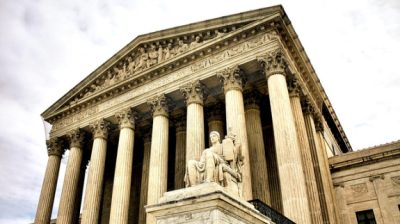Immigration Courts
Immigration courts play a crucial role in ensuring that immigration laws are applied fairly and consistently, providing due process to those facing removal. Learn more about issues facing the courts today and explore the actions we're taking to ensure the rights of immigrants are upheld and legal integrity is maintained.

Immigration Case Backlog Reaches All-Time High, Report Shows
As the U.S. continues to pour money into immigration enforcement and detention, the resources necessary for the immigration court system to keep up with enforcement have not been appropriated. In fact, a record number of immigration cases—275,316 as of May 2011—are in the Immigration Court backlog according to a recent report by the Transactional Records Access Clearinghouse (TRAC). In four months, the case backlog grew 2.8%, and it has grown 48% since FY2008. Read More

ACLU, Civil Rights Groups File Suit Against Alabama’s Immigration Law
More than just stars fell on Alabama last week when civil rights groups filed a class action lawsuit against the state’s restrictive immigration law, HB 56, charging that the law unconstitutionally interferes with federal law and will lead to racial profiling. Filed on Friday, the lawsuit makes Alabama the fifth state (joining Arizona, Utah, Indiana and Georgia) to defend itself against a costly legal challenge to Arizona-style immigration laws. Federal courts have blocked key provisions of restrictive immigration enforcement laws in every state that passed them, save South Carolina, which only recently passed a copycat law. Read More

New Data Shows Government Still Prioritizing Immigration Prosecutions over Dangerous Crime
Two recent reports by the Transactional Records Access Clearinghouse (TRAC), a research center out of Syracuse University, confirm that the federal government is prioritizing immigration enforcement over potentially far more dangerous activities, such as gun smuggling. While prosecutions for illegal re-entry are up in criminal courts, prosecutions for weapons-related offenses are down in the last year. Not surprisingly, this prioritization of immigration prosecutions over dangerous crime has largely gone unnoticed by immigration restrictionists who routinely underscore “violence along the border” as a reason to bolster a border-only agenda. Read More

South Carolina Governor Signs $1.3 Million Immigration Enforcement Law
This week, on the same day that a federal judge enjoined key provisions of Georgia’s immigration law, South Carolina Governor Nikki Haley signed an Arizona-style immigration bill into law. To date, federal judges in four states (Arizona, Utah, Indiana and Georgia) have blocked key provisions of their Arizona-inspired immigration laws, arguing that these laws unlawfully interfere with federal authority over immigration matters. So what makes South Carolina any different? Nothing, except for the $1.3 million price tag in addition to the cost of implementation and legal fees incurred from defending the law. Read More

Federal Courts Block Key Provisions of Restrictive Immigration Laws in Georgia and Indiana
Today, a federal judge in Georgia granted a preliminary injunction against key provisions of the state’s immigration law, HB 87, which was slated to take effect Friday. Today’s decision follows another federal court decision handed down last week in Indiana which also blocked key provisions of the state’s new immigration law, SB 590. And these restrictive immigration laws aren’t the only ones caught up in legal battles. Several restrictive immigration laws are being challenged in court with more likely to follow. This week, the Department of Justice (DOJ) requested a meeting with Alabama law enforcement officials to determine whether or not to file suit against their immigration law while civil rights groups threatened to sue South Carolina if Gov. Nikki Haley signs their restrictive bill, S 20, into law. Read More

BIA Provides Important But Incomplete Guidance on Mental Competency Issues
Washington, D.C.—The American Immigration Council’s Legal Action Center (LAC) cautiously applauds last week’s decision of the Board of Immigration Appeals concerning the rights of immigrants with mental disabilities in removal proceedings. Echoing concerns expressed in amicus briefs filed by the LAC… Read More

California’s Tuition Equity Law Upheld by U.S. Supreme Court
BY SUMAN RAGHUNATHAN, PROGRESSIVE STATES NETWORK Proposals to increase educational access for students (particularly the undocumented) continue to advance in state legislatures nationwide, even as they are being upheld in the nation’s courts. Earlier this month, the U.S. Supreme Court reinforced and upheld California’s tuition equity law, the nation’s oldest and one of the strongest tuition equity models nationwide, by choosing not to consider a challenge to the law. California’s law, AB 540, passed a decade ago and was already unanimously upheld by the State’s Supreme Court last November. Read More

Pending a Resolution of DOMA, Immigration Judges Should Exercise Discretion to Stay Removal Cases
BY BETH WERLIN AND VICTORIA NEILSON To date, five states plus the District of Columbia celebrate marriages of gay and lesbian couples and several other states honor such marriages. In addition, five countries, including Canada, permit marriages of gay and lesbian couples and at least fourteen additional countries recognize same-sex relationships for immigration purposes. Yet, because the U.S. immigration agencies rely on section 3 of the Defense of Marriage Act (DOMA)—defining marriage as a union between one man and one woman—lesbian and gay U.S. citizens and lawful permanent residents are barred from obtaining immigrant visas for their spouses, visas that are available to heterosexual U.S. citizens and residents with foreign-born spouses. Gay and lesbian noncitizens also are precluded from obtaining other immigration protections, including relief from removal, based on a marriage to a U.S. citizen or permanent resident. As a result, families are separated and spouses of U.S. citizens and lawful permanent residents are deported from the United States. Read More

Pending a Resolution of DOMA, Immigration Judges Should Exercise Discretion to Stay Removal Cases
BY BETH WERLIN AND VICTORIA NEILSON To date, five states plus the District of Columbia celebrate marriages of gay and lesbian couples and several other states honor such marriages. In addition, five countries, including Canada, permit marriages of gay and lesbian couples and at least fourteen additional countries recognize same-sex relationships for immigration purposes. Yet, because the U.S. immigration agencies rely on section 3 of the Defense of Marriage Act (DOMA)—defining marriage as a union between one man and one woman—lesbian and gay U.S. citizens and lawful permanent residents are barred from obtaining immigrant visas for their spouses, visas that are available to heterosexual U.S. citizens and residents with foreign-born spouses. Gay and lesbian noncitizens also are precluded from obtaining other immigration protections, including relief from removal, based on a marriage to a U.S. citizen or permanent resident. As a result, families are separated and spouses of U.S. citizens and lawful permanent residents are deported from the United States. Read More
Make a contribution
Make a direct impact on the lives of immigrants.
